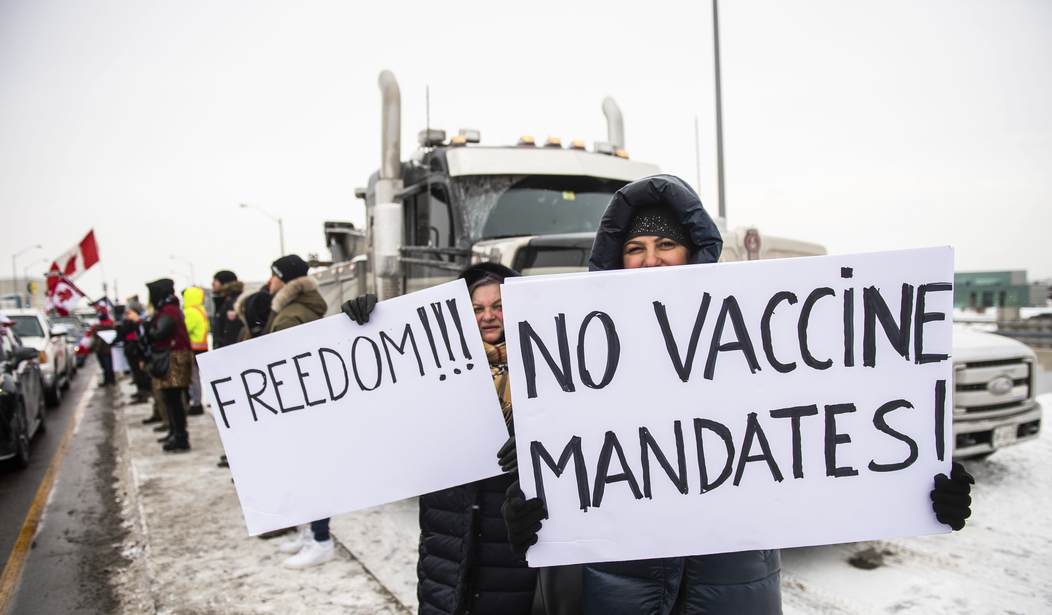A federal judge in Canada has ruled that the government's use of the Emergency Powers Act to disperse truckers who had occupied much of downtown Ottawa during the COVID-19 crisis was unreasonable and led to the infringement of individual rights.
"A federal judge earlier on Tuesday said the Liberal government's use of the Emergencies Act to clear the 'Freedom Convoy' demonstrations that paralyzed the national capital in 2022 was unreasonable and violated Charter rights," reports Reuters.
"I conclude that there was no national emergency justifying the invocation of the Emergencies Act and the decision to do so was therefore unreasonable and ultra vires," Federal Court Justice Richard Mosley wrote in the Tuesday decision, using the Latin for acting "beyond one's powers."
Mosley further devastated Prime Minister Justin Trudeau by adding, "I have concluded that the decision to issue the Proclamation does not bear the hallmarks of reasonableness – justification, transparency, and intelligibility – and was not justified in relation to the relevant factual and legal constraints that were required to be taken into consideration,"
In short, Trudeau panicked. He saw the truckers shutting down a couple of border crossings and getting some Canadians angry about traffic tie-ups in the capital. Worse, their cause was gaining support in some constituencies.
Finance Minister Chrystia Freeland said that the government will appeal the ruling. She said the decision to "invoke emergency powers was taken because the public safety of Canadians and national security were under threat," according to Reuters.
That's pretty much what the independent public inquiry into the federal government’s decision to invoke the Emergencies Act concluded in a 2,000-page report that parroted the Trudeau government's points.
But this is the first case to come before a court of law, and Trudeau, whose political standing is as low as any prime minister's in history, could ill afford the criticism.
"Lockdowns and vaccine mandates hit a nerve and mobilized populists who denounced it all as an encroachment on personal freedom," Politico's Zi-Ann Lum wrote earlier this month. "The 'Freedom Convoy' showdown demonstrated that Trudeau could win a fight over substance — he prevailed in a legal battle over his emergency crackdown — but lose in a war of sentiments."
Since then, Trudeau appears to have lost the legal battle too, with this week's court ruling. As the decision sinks in, his approval sits at a sub-Biden-esque 32 percent, with 64 percent disapproval, according to Angus Reid Institute.
Even lawmakers from Trudeau's own Liberal party are flirting with the idea that he should step down.
The draconian powers granted the Canadian government in a declared "emergency" resembled martial law edicts.
Invoking the Emergencies Act gave police additional power to remove and arrest protesters, allowed the government to freeze the assets of those suspected of funding the blockades and allowed for the commandeering of tow trucks.
The case against the Trudeau government in federal court was brought by the Canadian Civil Liberties Association and the Canadian Constitution Foundation and individuals.
The Canadian Civil Liberties Association, in a statement, said the court decision "sets a clear and critical precedent for every future government."
There's speculation that Trudeau's only hope to stay in office would be a Donald Trump presidency. The Canadian media is far more hysterically anti-Trump than the U.S. media, and Trudeau is looking to connect Conservative Party Leader Pierre Poilievre to Trump in any way he can.
But history may have already passed Trudeau by. His COVID-19 crackdowns were unnecessary as was his invocation of the Emergency Powers Act.
Canadians go to the polls in 2025.










